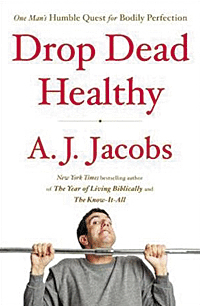Drop Dead Healthy: One Man’s Humble Quest for Bodily Perfection
Simon & Schuster
402 pages, $26
“Eat right and exercise” doesn’t sound so hard. In practice, though, it can be excruciating. That’s the message of A.J. Jacobs’s new memoir, “Drop Dead Healthy.”
Jacobs, who describes himself as “skinny fat,” had begun worrying that he might not be around for major milestones in his children’s lives.
And so, since he’s a pioneer in the field of doing extreme things and then writing books about them — reading the entire Encyclopedia Britannica for “The Know-It-All,” following every rule in the Bible for “The Year of Living Biblically” — he decided to pursue health as far as he possibly could.
This is not a science book or a how-to guide. Although Jacobs talks with experts and notes some studies, his experiments frequently skew toward the faddish — the ultra-low-carb caveman diet, barefoot running, a juice fast.
At first, this troubled me, though fads are more entertaining than solid science. But I soon realized that Jacobs was approaching “being healthy” the way most people do — in fits and starts, trying to figure out what works for him.
To his credit, he’s clear with the caveats to his more outlandish approaches. He’s also a genial, amusing narrator who has the grace to give his wife all the best punch lines.
Ultimately, Jacobs’s goal is to find sustainable habits. He isn’t hawking one approach; he’s trying to find out what he can stand to do every day, possibly for decades.
And so we see him doing a triathlon and being freaked out by the icy water off New York’s Staten Island, hating the Blueprint Cleanse, and worrying about what it means not to have been breast-fed.
Unlike the guys on the covers of fitness magazines, Jacobs isn’t trying to prove it’s easy to stay on the healthy straight-and-narrow.
Most affecting are the sections of the book he devotes to his aging grandfather, which are considerably more open and less jokey. When his grandfather dies, Jacobs grieves — and falls off the health wagon. Getting back on it is difficult, though he manages. These passages are a wonderful homage to a man Jacobs clearly admired.
His emotional honesty is echoed by another kind: the book opens with a photo of Jacobs’s shirtless gut. The thought of taking a similar photo, much less publishing my weight every month, makes me break into a cold sweat.
In appendices, Jacobs rounds up sane tips for general well-being, many of which are supported by strong science: eat mindfully, reduce stress through meditation and self-massage, and give yourself motivation (perhaps by writing a check for a donation to an organization you find noxious — he picks the Ku Klux Klan — and having someone mail it if you don’t make your goal).
But that’s not the point of the book, really.
Acquiring healthy habits isn’t easy, but Jacobs makes it feel like something that’s within reach of any Joe or Jill Couch Potato. That’s an accomplishment worth admiring.
Send questions/comments to the editors.



Comments are no longer available on this story